Unit 6When was it invented Section A3 Grammar Focus-4c课件 (共33张PPT)人教版英语九年级全册
文档属性
| 名称 | Unit 6When was it invented Section A3 Grammar Focus-4c课件 (共33张PPT)人教版英语九年级全册 | 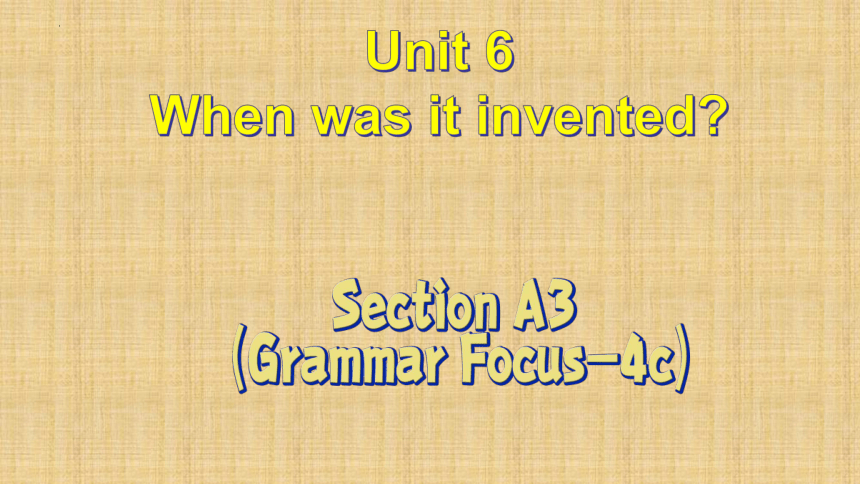 | |
| 格式 | pptx | ||
| 文件大小 | 15.0MB | ||
| 资源类型 | 教案 | ||
| 版本资源 | 人教新目标(Go for it)版 | ||
| 科目 | 英语 | ||
| 更新时间 | 2024-10-01 10:08:06 | ||
图片预览

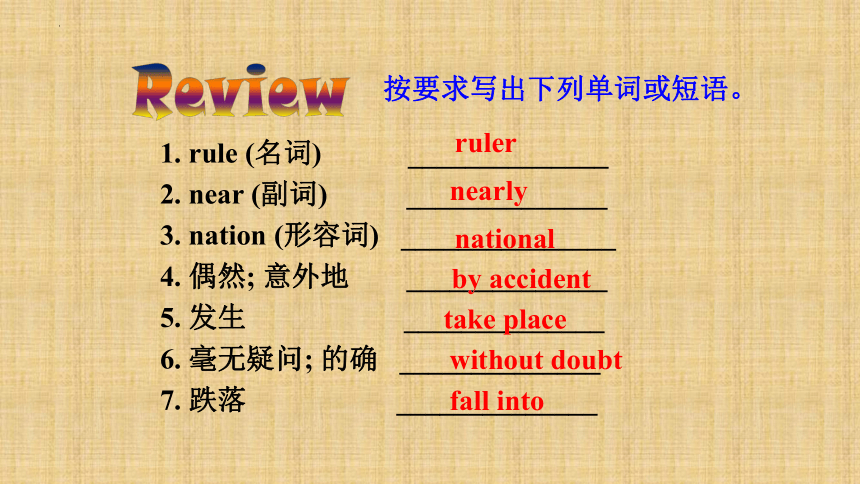
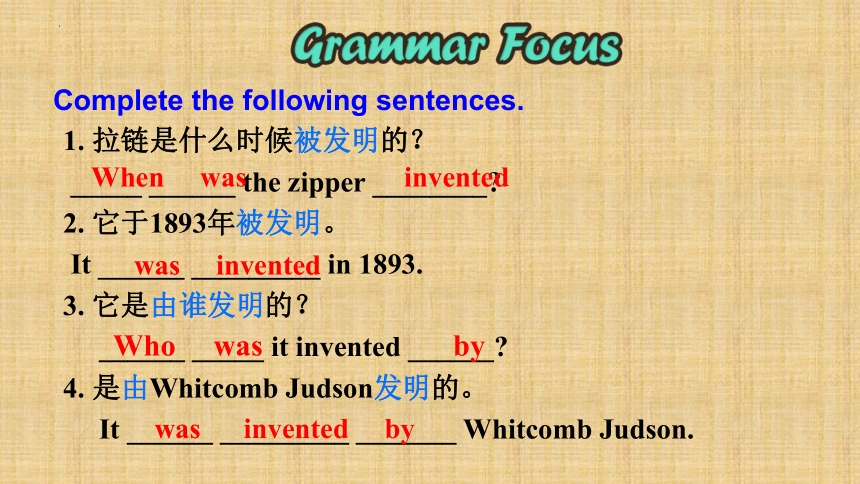

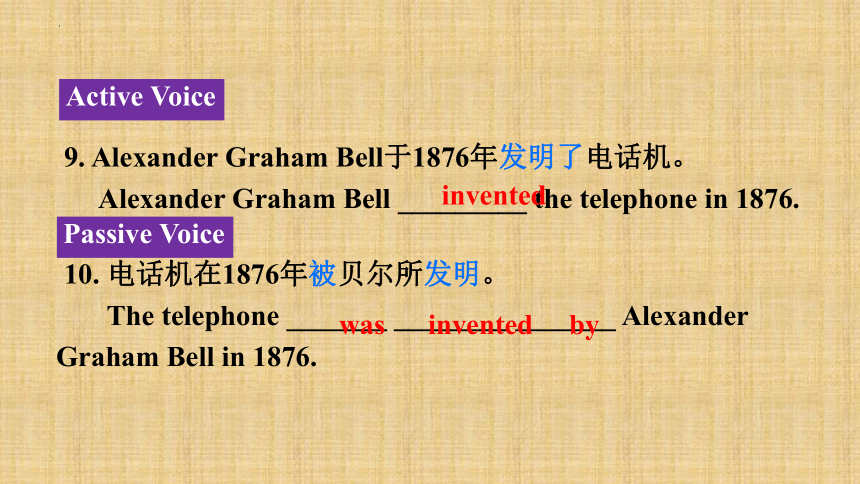

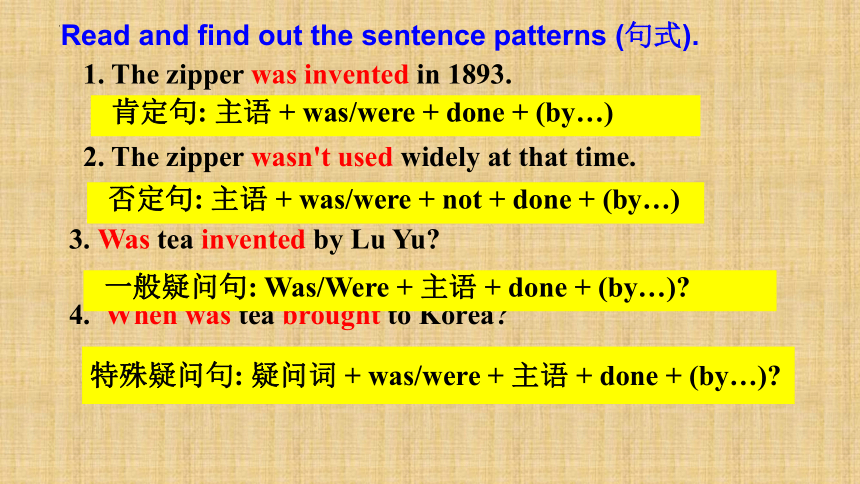

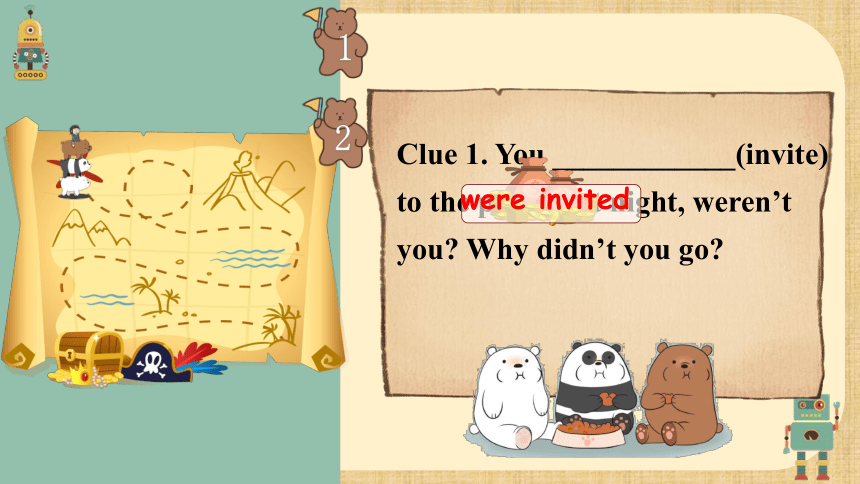

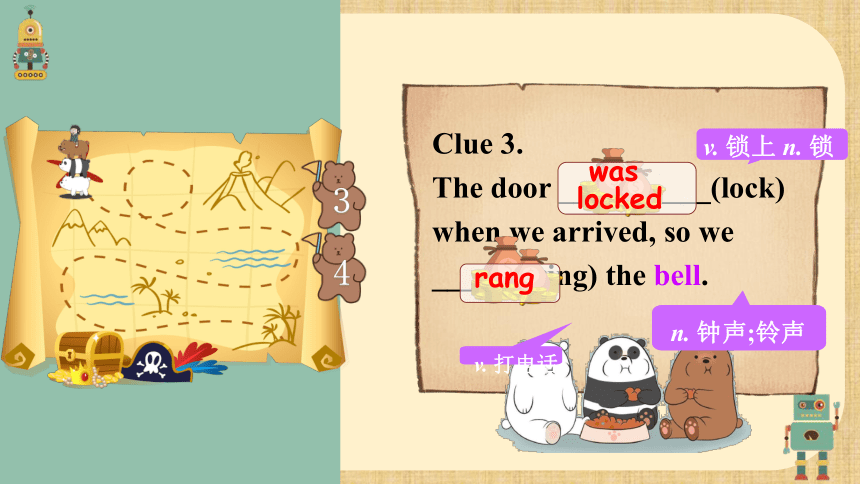
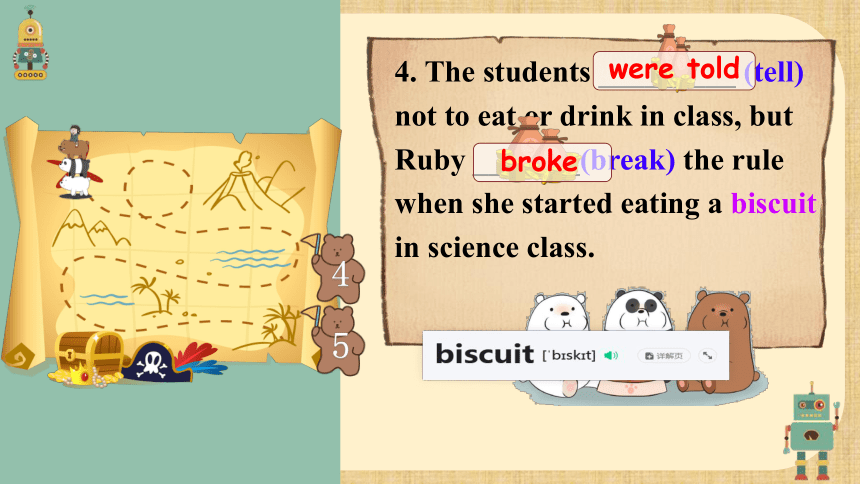
文档简介
(共33张PPT)
Unit 6
When was it invented
1. rule (名词) ______________
2. near (副词) ______________
3. nation (形容词) _______________
4. 偶然; 意外地 ______________
5. 发生 ______________
6. 毫无疑问; 的确 ______________
7. 跌落 ______________
按要求写出下列单词或短语。
take place
nearly
ruler
national
by accident
without doubt
fall into
Complete the following sentences.
1. 拉链是什么时候被发明的?
_____ ______ the zipper ________
2. 它于1893年被发明。
It ______ _________ in 1893.
3. 它是由谁发明的?
______ _____ it invented ______
4. 是由Whitcomb Judson发明的。
It ______ _________ _______ Whitcomb Judson.
was invented
When was invented
Who was by
was invented by
5. 茶叶什么时候被带到朝鲜的?
______ ______ tea _________ to Korea
6. 是在六到七世纪之间被带到朝鲜的。
It ______ ________ to Korea during the 6th and 7th centuries.
7. 热冰淇淋勺用来做什么?
What _____ the hot ice-cream scoop ______ ______
8. 它用来盛很凉的冰淇淋。
It’s ______ ______ ________ really cold ice-cream.
When was brought
was brought
is used for
used for serving
9. Alexander Graham Bell于1876年发明了电话机。
Alexander Graham Bell _________ the telephone in 1876.
10. 电话机在1876年被贝尔所发明。
The telephone _______ ________ _______ Alexander Graham Bell in 1876.
invented
was invented by
Active Voice
Passive Voice
Concept 概念
1. 主动语态表示主语是动作的_________。
the Passive Voice
被动语态
the Active Voice
主动语态
动词两种语态
The telephone was invented by Alexander Graham Bell in 1876.
2. 被动语态表示主语是动作的________。
Alexander Graham Bell invented the telephone in 1876.
执行者
承受者
Read and find out the sentence patterns (句式).
1. The zipper was invented in 1893.
2. The zipper wasn't used widely at that time.
3. Was tea invented by Lu Yu
4. When was tea brought to Korea
肯定句: 主语 + was/were + done + (by…)
否定句: 主语 + was/were + not + done + (by…)
一般疑问句: Was/Were + 主语 + done + (by…)
特殊疑问句: 疑问词 + was/were + 主语 + done + (by…)
Game Time
Clue 1. You ____________(invite) to the party last night, weren’t you Why didn’t you go
were invited
1
2
Clue 2.
The earthquake happened
all of a sudden,
but luckily the villagers
______________(bring) to a
safe place.
was brought
2
3
突然;猛地
Clue 3.
The door __________(lock) when we arrived, so we ______(ring) the bell.
was locked
3
4
rang
n. 钟声;铃声
v. 锁上 n. 锁
v. 打电话
4. The students _________ (tell) not to eat or drink in class, but Ruby _______(break) the rule when she started eating a biscuit in science class.
were told
broke
4
5
5. The cookies _________(eat) by the hungry kids in less than 20 minutes, and they really _______(like) them.
were eaten
liked
5
End
2
Exercise 3
闯关游戏,句型转换。
Exercise 2
START
Let's practice more
FINISH LINE
Click on the rider
START
1
2
3
4
5
1.They sold the fridge at a low price.
CHECK
STAGE
1
The fridge was sold at a low price.
n. 冰箱
adj. 低的;矮的
FINISH LINE
Click on the rider
START
1
2
3
4
5
2.Somebody stole my camera from my hotel room.
CHECK
STAGE
2
My camera was stolen from my hotel room..
TIME’S UP
FINISH LINE
Click on the rider
START
1
2
3
4
5
3.Where did you take these photos
CHECK
STAGE
3
Where were these photos taken
TIME’S UP
FINISH LINE
Click on the rider
START
1
2
3
4
5
4.Our parents advised us not to go out alone.
CHECK
STAGE
4
We were advised by our parents not to go out alone.
TIME’S UP
advise sb not to do 建议某人不做
go out alone独自外出
FINISH LINE
Click on the rider
START
1
2
3
4
5
5.Different writers translated the book into different languages.
CHECK
STAGE
5
The book was translated into different languages by different writers.
TIME’S UP
Finish
GOOD JOB!
YOU ARE THE WINNER!
被动语态易错点
Look at sentences and work out the rules.
1. You shouldn't laugh at David.
David shouldn't be laughed .
易错点1:含介词,副词的动词短语转化为被动语态时,
介词,副词不可省。
e.g. take care of, look after, laugh at, listen to, put on, take off 等
at.
被动语态易错点
Look at sentences and work out the rules.
1. My mother made me clean the room.
I was made clean the room by my mother.
易错点2:主动语态中的感官动词(see, hear, notice等)和使役动词(let, have, make)后跟省略to的动词不定式作宾补,在变被动语态时宾补前的to要还原。
e.g. make sb. do sth 变被动: sb. be made to do sth.
see sb. do sth. 变被动: sb. be seen to do sth.
to
口诀:一感二听三让四看,主动句中to 离开,被动句中to回来
Tips:一感(feel)二听(hear, listen to)三让(make, let, have)
四看(see, watch, notice, look at)
被动语态易错点
Look at sentences and work out the rules.
1. We need to water the flowers every day.
The flowers need to be watered every day .
易错点3:need/require 的两种被动:
sb. need/require to do sth. sth. need/require to be done
sth. need/require doing
The flowers need watering every day .
被动语态易错点
Look at sentences and work out the rules.
1. We need to water the flowers every day.
The flowers need to be watered every day .
易错点3:need/require 的两种被动:
sb. need/require to do sth. sth. need/require to be done
sth. need/require doing
The flowers need watering every day .
被动语态易错点
Learn more forms of passive voice.
1. The idea sounds great.
3. The book sells soft.
易错点4:无被动的动词
1.系动词:look, sound, smell, taste, feel...
2. 两个发生:happen, take palce
3. 畅销,好洗:sell well, wash easily
4. 属于:belong to
2. The earthquake happened on a cold morning.
4. The Diaoyu Island belongs to China.
1. Review Grammar.
2. Do the exercises on 4c.
Thank you!
Unit 6
When was it invented
1. rule (名词) ______________
2. near (副词) ______________
3. nation (形容词) _______________
4. 偶然; 意外地 ______________
5. 发生 ______________
6. 毫无疑问; 的确 ______________
7. 跌落 ______________
按要求写出下列单词或短语。
take place
nearly
ruler
national
by accident
without doubt
fall into
Complete the following sentences.
1. 拉链是什么时候被发明的?
_____ ______ the zipper ________
2. 它于1893年被发明。
It ______ _________ in 1893.
3. 它是由谁发明的?
______ _____ it invented ______
4. 是由Whitcomb Judson发明的。
It ______ _________ _______ Whitcomb Judson.
was invented
When was invented
Who was by
was invented by
5. 茶叶什么时候被带到朝鲜的?
______ ______ tea _________ to Korea
6. 是在六到七世纪之间被带到朝鲜的。
It ______ ________ to Korea during the 6th and 7th centuries.
7. 热冰淇淋勺用来做什么?
What _____ the hot ice-cream scoop ______ ______
8. 它用来盛很凉的冰淇淋。
It’s ______ ______ ________ really cold ice-cream.
When was brought
was brought
is used for
used for serving
9. Alexander Graham Bell于1876年发明了电话机。
Alexander Graham Bell _________ the telephone in 1876.
10. 电话机在1876年被贝尔所发明。
The telephone _______ ________ _______ Alexander Graham Bell in 1876.
invented
was invented by
Active Voice
Passive Voice
Concept 概念
1. 主动语态表示主语是动作的_________。
the Passive Voice
被动语态
the Active Voice
主动语态
动词两种语态
The telephone was invented by Alexander Graham Bell in 1876.
2. 被动语态表示主语是动作的________。
Alexander Graham Bell invented the telephone in 1876.
执行者
承受者
Read and find out the sentence patterns (句式).
1. The zipper was invented in 1893.
2. The zipper wasn't used widely at that time.
3. Was tea invented by Lu Yu
4. When was tea brought to Korea
肯定句: 主语 + was/were + done + (by…)
否定句: 主语 + was/were + not + done + (by…)
一般疑问句: Was/Were + 主语 + done + (by…)
特殊疑问句: 疑问词 + was/were + 主语 + done + (by…)
Game Time
Clue 1. You ____________(invite) to the party last night, weren’t you Why didn’t you go
were invited
1
2
Clue 2.
The earthquake happened
all of a sudden,
but luckily the villagers
______________(bring) to a
safe place.
was brought
2
3
突然;猛地
Clue 3.
The door __________(lock) when we arrived, so we ______(ring) the bell.
was locked
3
4
rang
n. 钟声;铃声
v. 锁上 n. 锁
v. 打电话
4. The students _________ (tell) not to eat or drink in class, but Ruby _______(break) the rule when she started eating a biscuit in science class.
were told
broke
4
5
5. The cookies _________(eat) by the hungry kids in less than 20 minutes, and they really _______(like) them.
were eaten
liked
5
End
2
Exercise 3
闯关游戏,句型转换。
Exercise 2
START
Let's practice more
FINISH LINE
Click on the rider
START
1
2
3
4
5
1.They sold the fridge at a low price.
CHECK
STAGE
1
The fridge was sold at a low price.
n. 冰箱
adj. 低的;矮的
FINISH LINE
Click on the rider
START
1
2
3
4
5
2.Somebody stole my camera from my hotel room.
CHECK
STAGE
2
My camera was stolen from my hotel room..
TIME’S UP
FINISH LINE
Click on the rider
START
1
2
3
4
5
3.Where did you take these photos
CHECK
STAGE
3
Where were these photos taken
TIME’S UP
FINISH LINE
Click on the rider
START
1
2
3
4
5
4.Our parents advised us not to go out alone.
CHECK
STAGE
4
We were advised by our parents not to go out alone.
TIME’S UP
advise sb not to do 建议某人不做
go out alone独自外出
FINISH LINE
Click on the rider
START
1
2
3
4
5
5.Different writers translated the book into different languages.
CHECK
STAGE
5
The book was translated into different languages by different writers.
TIME’S UP
Finish
GOOD JOB!
YOU ARE THE WINNER!
被动语态易错点
Look at sentences and work out the rules.
1. You shouldn't laugh at David.
David shouldn't be laughed .
易错点1:含介词,副词的动词短语转化为被动语态时,
介词,副词不可省。
e.g. take care of, look after, laugh at, listen to, put on, take off 等
at.
被动语态易错点
Look at sentences and work out the rules.
1. My mother made me clean the room.
I was made clean the room by my mother.
易错点2:主动语态中的感官动词(see, hear, notice等)和使役动词(let, have, make)后跟省略to的动词不定式作宾补,在变被动语态时宾补前的to要还原。
e.g. make sb. do sth 变被动: sb. be made to do sth.
see sb. do sth. 变被动: sb. be seen to do sth.
to
口诀:一感二听三让四看,主动句中to 离开,被动句中to回来
Tips:一感(feel)二听(hear, listen to)三让(make, let, have)
四看(see, watch, notice, look at)
被动语态易错点
Look at sentences and work out the rules.
1. We need to water the flowers every day.
The flowers need to be watered every day .
易错点3:need/require 的两种被动:
sb. need/require to do sth. sth. need/require to be done
sth. need/require doing
The flowers need watering every day .
被动语态易错点
Look at sentences and work out the rules.
1. We need to water the flowers every day.
The flowers need to be watered every day .
易错点3:need/require 的两种被动:
sb. need/require to do sth. sth. need/require to be done
sth. need/require doing
The flowers need watering every day .
被动语态易错点
Learn more forms of passive voice.
1. The idea sounds great.
3. The book sells soft.
易错点4:无被动的动词
1.系动词:look, sound, smell, taste, feel...
2. 两个发生:happen, take palce
3. 畅销,好洗:sell well, wash easily
4. 属于:belong to
2. The earthquake happened on a cold morning.
4. The Diaoyu Island belongs to China.
1. Review Grammar.
2. Do the exercises on 4c.
Thank you!
同课章节目录
- Unit 1 How can we become good learners.
- Section A
- Section B
- Unit 2 I think that mooncakes are delicious!
- Section A
- Section B
- Unit 3 Could you please tell me where the restroom
- Section A
- Section B
- Unit 4 I used to be afraid of the dark.
- Section A
- Section B
- Unit 5 What are the shirts made of?
- Section A
- Section B
- Review of Units 1-5
- Unit 6 When was it invented?
- Section A
- Section B
- Unit 7 Teenagers should be allowed to choose their
- Section A
- Section B
- Unit 8 It must belong to Carla.
- Section A
- Section B
- Unit 9 I like music that I can dance to.
- Section A
- Section B
- Unit 10 You're supposed to shake hands.
- Section A
- Section B
- Review of Units 6-10
- Unit 11 Sad movies make me cry.
- Section A
- Section B
- Unit 12 Life is full of the unexpected
- Section A
- Section B
- Unit 13 We're trying to save the earth!
- Section A
- Section B
- Unit 14 I remember meeting all of you in Grade 7.
- Section A
- Section B
- Review of Units 11-14
